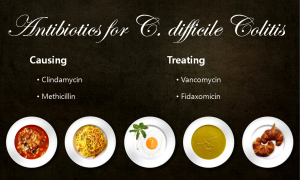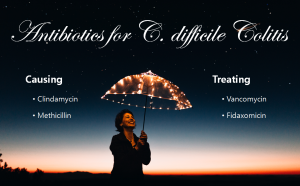What is C. Difficile Colitis?
Clostridium difficile (also called C. difficile) is a bacteria which can cause inflammation. It is known as ‘colitis’ in the large intestine or colon. If you get antibiotics, you can maybe get ‘C. difficile Colitis’. It can be said ‘Opportunistic infection‘. It means an infection caused by pathogens that take advantage of an opportunity not normally available, such as a host with a weakened immune system. C. difficile is infectious. C. difficile Colitis is common in old patients who are in hospitals and who are getting chemotherapy for cancer. I will show you antibiotics more in detail.
“Medicine is not only a science; it is also an art. Its does not consist of compounding pills and plasters; it deals with the very processes of life, which must be understood before they may be guided.” – Paracelsus
Causing antibiotics
 Clindamycin and Methicillin have side effects that can cause C. difficile Colitis. I will introduce action mechanisms, characteristics and side effects of each antibiotics. First, Clindamycin binds to 23S rRNA of 50S(bacterial ribosome) to reduce synthesis of protein to. It can treat Anaerobic bacteria infection. Its side effect is, we already know, a C. difficile Colitis. Second, Methicillin irreversibly binds to transpeptidase of bacteria to inhibit cross linking of murein polymer. It is a 2nd generation penicillin which can be used for Skin and soft tissue and MSSA(Methicillin-sensitive Staphylococcus aureus). Its side effects are ‘Hypersensitivity’, ‘Neurotoxicity’ and ‘C. difficile Colitis'(by Oral).
Clindamycin and Methicillin have side effects that can cause C. difficile Colitis. I will introduce action mechanisms, characteristics and side effects of each antibiotics. First, Clindamycin binds to 23S rRNA of 50S(bacterial ribosome) to reduce synthesis of protein to. It can treat Anaerobic bacteria infection. Its side effect is, we already know, a C. difficile Colitis. Second, Methicillin irreversibly binds to transpeptidase of bacteria to inhibit cross linking of murein polymer. It is a 2nd generation penicillin which can be used for Skin and soft tissue and MSSA(Methicillin-sensitive Staphylococcus aureus). Its side effects are ‘Hypersensitivity’, ‘Neurotoxicity’ and ‘C. difficile Colitis'(by Oral).
Treating antibiotics
 Vancomycin and Fidaxomicin can treat C. difficile Colitis. Action mechanisms, characteristics and side effects are here. First, Vancomycin inhibits Murein polymerization to inhibit synthesis of cell wall. It can be used for Gram (+) bacteria. Its effects depend on IV and Oral administration. With IV administration, It can treat MRSA(Methicillin-resistant Staphylococcus aureus). With Oral administration, It can treat ‘Pseudomembranous colitis’ of C. difficile. Side effects are ‘Red man syndrome’, ‘Nephrotoxicity’ and ‘Ototoxicity’. Second, Fidaxomicin binds to RNA polymerase to inhibit ‘initiation stage’ of RNA synthesis. It can treat C. difficile Colitis and its side effects are ‘Nausea’, ‘Vomiting’ and ‘Abdominal pain’.
Vancomycin and Fidaxomicin can treat C. difficile Colitis. Action mechanisms, characteristics and side effects are here. First, Vancomycin inhibits Murein polymerization to inhibit synthesis of cell wall. It can be used for Gram (+) bacteria. Its effects depend on IV and Oral administration. With IV administration, It can treat MRSA(Methicillin-resistant Staphylococcus aureus). With Oral administration, It can treat ‘Pseudomembranous colitis’ of C. difficile. Side effects are ‘Red man syndrome’, ‘Nephrotoxicity’ and ‘Ototoxicity’. Second, Fidaxomicin binds to RNA polymerase to inhibit ‘initiation stage’ of RNA synthesis. It can treat C. difficile Colitis and its side effects are ‘Nausea’, ‘Vomiting’ and ‘Abdominal pain’.
“I swear to fulfill, to the best of my ability and judgment, this covenant: I will not be ashamed to say “I know not,” nor will I fail to call in my colleagues when the skills of another are needed for a patient’s recovery.” – Hippocratic Oath